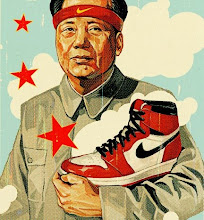 China is getting fat and less healthy. It's true.
China is getting fat and less healthy. It's true.I first wrote about this problem more than a year ago with my analysis of McDonald's in China. Others have also ventured into this realm.
A USA Today article written more than a year ago, Obesity of China's kids stuns officials, described the shocking changes in Chinese children.
New figures from the Health Ministry show that urban Chinese boys age 6 are 2.5 inches taller and 6.6 pounds heavier on average than Chinese city boys 30 years ago.Chinese children have a lot of factors working against them in the battle against bad health and obesity:The average 6-year-old in Beijing or Shanghai weighs nearly 47 pounds and is 3 feet, 10.5 inches tall, ministry figures show. The average American of the same age weighs just over 50 pounds and also is 3 feet 10.5 inches tall, according to data from the U.S. Centers for Disease Control and Prevention.
- Children are traditionally considered more healthy (and better) if they are fatter.
- Due to the 1 child policy, Chinese children are often spoiled by parents and grandparents - meaning more trips to fat-happy places like McD's.
- The demands on a child's academics is such that some kids start going to after school classes when they are as young as the 3rd grade. More classes = No playing outdoors after school.
- When students do have time on their hands, its often spent online playing games like CounterStrike, WoW or chatting on QQ. This not only results in muscle atrophy but also a decreased people-skills ability.
- There are very few, if any, outdoor clubs and organizations to join. In the US there are basketball, soccer, football teams, little league, boy & girl scouts. In China ... I've never heard of any.
- When kids get into high school, academics is still the end all be all preparation for the College Entrance Examination (高考). School sport systems are very rare and active lifestyles really disappear.
- More meat and dairy products are available due to increased economic development. Many Chinese enjoy strictly eating meat almost exclusively. This is even worse when meat is usually prepared with a solid layer of oil/grease.
- When graduates enter the workforce they usually find white collar jobs. Instead of physical labor, people sit next to their computer day in and day out.
- With more and more cars on the road, people are travel less by foot or bike and more by car.
- It is very difficult to eat healthy.
I can state from personal experience that this is occurring. My cousin in Harbin is 18 and is starting college next year. He grew up as the "little emperor" and was a cute, chubby kid. My extended family obsessively fed him while focusing stringently on his future academic prospects. He was decent at school, but he was aided with constant help and review classes beginning at age 10.
My cousin never really played any sports nor did he even go out to hang out with friends. (I honestly dont know if he has any friends). The only things he does is stay home, go online, study and eat. The expectations on him by his parents and grandparents are to study. I dont know if he even does chores around the house.
What began as a promising kid is now a rather fat, unmotivated, friendless and people-skills-less person who grew up like many other kids in China. I honestly dont know how he's going to survive in modern society.
Of course, China isn't standing still waiting for this problem to expand. There has been not only government initiatives to step obesity but also private sector developments. Re-examinations of the educational system and parental responsibilites are also occuring.
- Fat camps have popped up all over the country for obese children. TV programs similar to the US "The Biggest Loser" are also appearing on TV.
- Chinese people, while getting more lazy and less active are still relatively more active than counterparts in other countries. The use of public transportation and walking in China helps this cause.
- Chinese people for some reason enjoy climbing up and down mountains as weekend functions of fun. That definitely helps.
- Some more affluent Chinese families are promoting a more healthy and active lifestyle for their kids. This includes more traveling, more exercize and joining clubs
- Basketball is increasingly popular meaning more people are excercizing everyday.
- Preventative health is big in China. People often eat vitamins and stay away from pain killers and antibiotics.
- In my opinion, however, the biggest development has been the huge expansion of exercise in cities among the urban population.



